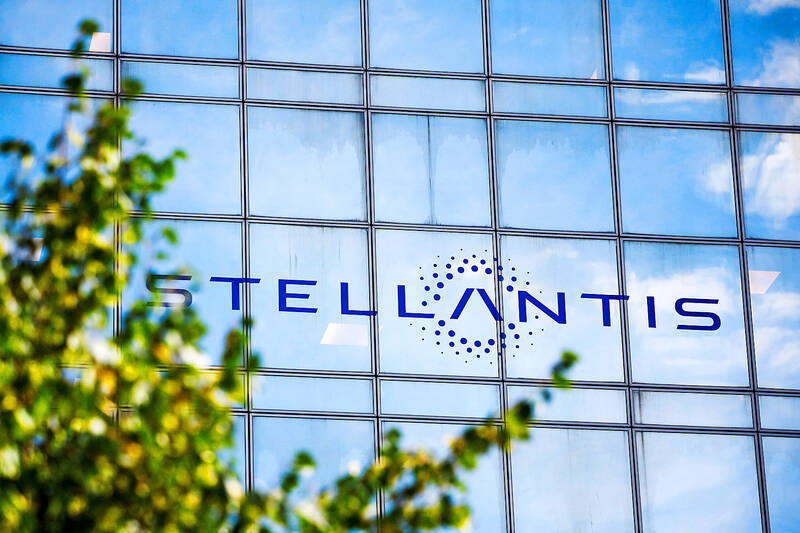Shares in automakers Stellantis NV and Britain’s Aston Martin Lagonda Global Holdings PLC tumbled yesterday after both companies joined European rivals in cutting their profit forecasts.
European auto giant Stellantis, whose other top brands include Peugeot, Ram and Fiat, cited efforts to improve its US business as well as competition from Chinese vehicle manufacturers.
The company, which also makes Maserati, Dodge and Chrysler cars, said it expects an adjusted operating income margin ranging between 5.5 and 7.0 percent.

Photo: Reuters
It had previously expected a double-digit growth.
Stellantis shares sank by almost 13 percent to 12.74 euros (US$14.25) in late morning deals on the Paris stock exchange.
The company in a statement said efforts to improve its business in North America accounted for about two-thirds of the revision of its financial guidance for the year.
Stellantis said it brought forward to the end of this year plans to reduce its dealer inventory levels to 330,000 units in the US.
The company, which previously expected a positive cash flow, also said it forecasts negative cash flow ranging between 5 billion and 10 billion euros.
“Deterioration in the global industry backdrop reflects a lower 2024 market forecast than at the beginning of the period, while competitive dynamics have intensified due to both rising industry supply, as well as increased Chinese competition,” Stellantis said.
European car companies have struggled to keep up with competition from Chinese electric vehicles (EVs).
German auto giants Volkswagen AG, Mercedes-Benz AG and BMW AG have also cut their guidance over the past few weeks, all partly due to weakness in China.
Aston Martin also cited the Chinese market as it trimmed its financial guidance for this year, saying its core profit is now expected to be “slightly below” the previous year’s.
The company’s shares were down more than 20 percent to £1.27 (US$1.70) in late morning deals in London.
Aston Martin, famous for being James Bond’s favorite car, in a statement said that it would cut production by 1,000 units this year “to address disruption in its supply chain and continued macroeconomic weakness in China.”
Delays in receiving components have hit the car maker’s output and postponed deliveries.
However, the company said its “fully reinvigorated portfolio of ultra-luxury high performance models” would support future growth.
Meanwhile, Chinese manufacturers sold the fewest EVs in 18 months to customers across Europe, with registrations falling by 48 percent in August from a year earlier — the second straight month of declining share for Chinese brands, figures provided by researcher Dataforce showed.
Automakers are still weighing the potential impact of the EU tariffs, which affect all EVs imported from China, including those from non-Chinese companies BMW, Stellantis and Tesla Inc. The added duties are set to be finalized this month, pending a member state vote, with negotiations between Beijing and Brussels taking place amid furious lobbying.
Additional reporting by Bloomberg

In Italy’s storied gold-making hubs, jewelers are reworking their designs to trim gold content as they race to blunt the effect of record prices and appeal to shoppers watching their budgets. Gold prices hit a record high on Thursday, surging near US$5,600 an ounce, more than double a year ago as geopolitical concerns and jitters over trade pushed investors toward the safe-haven asset. The rally is putting undue pressure on small artisans as they face mounting demands from customers, including international brands, to produce cheaper items, from signature pieces to wedding rings, according to interviews with four independent jewelers in Italy’s main

Japanese Prime Minister Sanae Takaichi has talked up the benefits of a weaker yen in a campaign speech, adopting a tone at odds with her finance ministry, which has refused to rule out any options to counter excessive foreign exchange volatility. Takaichi later softened her stance, saying she did not have a preference for the yen’s direction. “People say the weak yen is bad right now, but for export industries, it’s a major opportunity,” Takaichi said on Saturday at a rally for Liberal Democratic Party candidate Daishiro Yamagiwa in Kanagawa Prefecture ahead of a snap election on Sunday. “Whether it’s selling food or

CONCERNS: Tech companies investing in AI businesses that purchase their products have raised questions among investors that they are artificially propping up demand Nvidia Corp chief executive officer Jensen Huang (黃仁勳) on Saturday said that the company would be participating in OpenAI’s latest funding round, describing it as potentially “the largest investment we’ve ever made.” “We will invest a great deal of money,” Huang told reporters while visiting Taipei. “I believe in OpenAI. The work that they do is incredible. They’re one of the most consequential companies of our time.” Huang did not say exactly how much Nvidia might contribute, but described the investment as “huge.” “Let Sam announce how much he’s going to raise — it’s for him to decide,” Huang said, referring to OpenAI

Nvidia Corp’s negotiations to invest as much as US$100 billion in OpenAI have broken down, the Wall Street Journal (WSJ) reported, exposing a potential rift between two of the most powerful companies in the artificial intelligence (AI) industry. The discussions stalled after some inside Nvidia expressed concerns about the transaction, the WSJ reported, citing unidentified people familiar with the deliberations. OpenAI makes the popular chatbot ChatGPT, while Nvidia dominates the market for AI processors that help develop such software. The companies announced the agreement in September last year, saying at the time that they had signed a letter of intent for a strategic